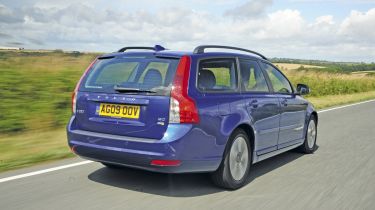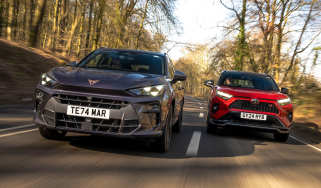Volvo V50 DRIVe START/STOP
Hi-tech Swede uses turbo power to deliver its eco message
Small capacity petrol engines are making a comeback thanks to modern turbo technology – but fitting small turbodiesels to big cars in the name of the environment is yet to catch on.
Volvo, however, is leading the charge with its new DRIVe range, and its eco- friendly V50 uses a 1.6-litre oil-burner to deliver the kind of CO2 emissions that will make many superminis blush. And
the good news for family buyers with a conscience is that you don’t have to wear your green intentions on your sleeve.
Every DRIVe model in the Volvo line-up gets the same low drag alloy wheels you see on our test car, but they’re the only real clues to the V50’s low emissions message. It might be getting on a bit, but it remains a stylish choice.
Inside, you can say much the same. The V50 is the Swedish firm’s top-selling model in the UK, and you can see why.
The cleanly styled interior has simple switchgear, decent materials and plenty of kit. However, the SE model costs £1,580 more than the BlueMotion 2, so the less well equipped DRIVe S Start/Stop is a closer match on price, at £19,345. Whichever trim level you choose, the Volvo can’t match the VW for space. As it’s 25cm shorter than its rival, this comes as no surprise, and its 417-litre boot is notably smaller than its rival’s 513-litre load area. Rear legroom is also more generous in the German car – so if space is your only concern, the VW leads the way.
Used - available now

2024 BMW
2 Series Gran Coupe
20,431 milesAutomaticPetrol1.5L
Cash £22,099
2022 Volvo
S60
15,501 milesAutomaticPetrol2.0L
Cash £23,599
2021 Mercedes
A-Class Saloon
9,754 milesAutomaticDiesel2.0L
Cash £22,499
2023 Honda
CR-V
14,943 milesAutomaticPetrol2.0L
Cash £27,060But we’re after the best green estate here, and that’s where the Volvo comes into its own. Riding 10mm lower than standard models to reduce drag, the DRIVe variant also features underbody panels to help smooth the flow of air around its body.
Other fuel-saving tricks include low rolling resistance tyres and low friction lubricants in the engine. An excellent Start/Stop system also kills the engine when you come to a standstill before starting it again the moment you depress the clutch to engage first gear.
Finally, regenerative charging uses energy produced under braking to keep the car’s two batteries topped up (a smaller second power pack helps the climate control to maintain cabin temperature when the engine isn’t running). As a result of these changes, the V50 DRIVe produces 104g/km of CO2 – 25g/km less than the Passat.
It also led the way at the pumps. A return of 42.8mpg during our short time with the car was compromised by our performance tests, but it still beat the VW’s 42.1mpg.
Hit the road and Volvo maintains its advantage – against the clock at least. It was quicker in all but one of our tests, and while it needs to be worked hard to extract these figures, you won’t get left behind at the lights or feel short-changed on the motorway.
The V50’s major deficiencies are dynamic, as it lacks the handling finesse of the best family estates, with numb steering and suspension that struggles with coarse surfaces. The Passat is more accomplished to drive and cheaper – but will that be enough against the more efficient Volvo?
Details
Chart position: 2
WHY: Volvo is going to town with its DRIVe technology – we want to see if the V50 is the new green estate car of choice.







